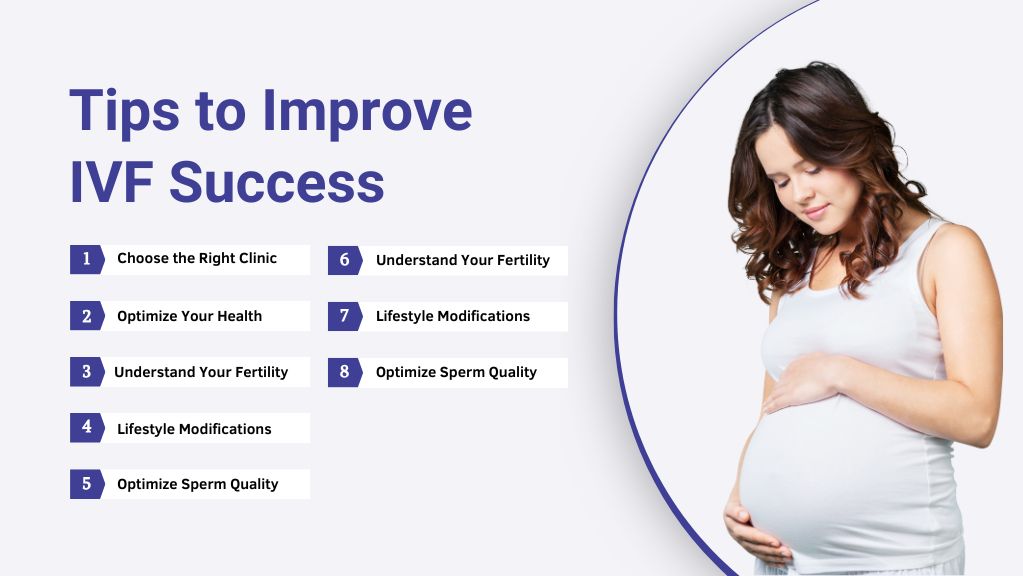Tips to Boost Your Chances of Pregnancy After IVF
Many couples dream of having a baby, but infertility can make this journey challenging. In vitro fertilization (IVF) is a popular method to help achieve parenthood. Adjusting your lifestyle before and after the IVF procedure can greatly improve your chances of success. Here’s a simple guide with tips to help you prepare.

What Is IVF?
IVF is a process where a doctor combines the father’s sperm and the mother’s eggs in a laboratory. Once the egg is fertilized and becomes a healthy embryo, it is placed into the mother’s uterus to grow into a baby. Today, IVF is considered one of the most effective assisted reproductive methods available.
Getting Ready for IVF
Doctors recommend starting healthy habits at least three months before your IVF treatment. Both partners play a role in preparing the body for a successful cycle. Here are some easy-to-follow tips:
1. Eat a Nutritious Diet
- For Women:
- Nourish Your Eggs and Uterus:
Choose foods that help boost egg quality and support the uterus. Incorporate green leafy vegetables (like kale, spinach, and broccoli), whole grains (brown rice, whole bread, quinoa), legumes (kidney beans, lentils), berries, dairy products, and healthy fats like avocado and olive oil.
- Nourish Your Eggs and Uterus:
- For Men:
- Boost Sperm Health:
Include foods that improve sperm quality and count. Good choices include eggs, various beans, tomatoes, garlic, oysters, beef, bananas, pomegranate, berries, and even a bit of chocolate. Avoid processed foods, sugary items, and foods high in unhealthy fats.
- Boost Sperm Health:
2. Maintain a Healthy Weight
Keeping your weight in a healthy range is important. For many Asian individuals, a Body Mass Index (BMI) below 23.0 kg/m² is recommended. Regular, gentle exercise like walking or yoga can help you stay fit without overexerting yourself. Avoid very strenuous activities during this period.
3. Limit Caffeine Intake
Try to keep your caffeine consumption to no more than 1-2 cups of coffee per day. High caffeine levels may lower the chances of a successful pregnancy.
4. Avoid Smoking and Alcohol
Smoking and excessive alcohol can negatively affect fertility. They can reduce the quality of eggs and sperm, and may also interfere with embryo implantation. It’s best to stop smoking and limit alcohol as you prepare for IVF.
5. Get Enough Sleep
Aim for 7-8 hours of sleep every night. Proper sleep helps your body repair itself and keeps your hormones balanced. Avoid eating or drinking caffeine a few hours before bedtime to improve the quality of your sleep.
6. Take Important Supplements
- Folic Acid:
Start taking folic acid at least three months before trying to conceive. Folic acid helps prevent birth defects and supports early fetal development. - Vitamin D:
Vitamin D is also important for a healthy pregnancy. Check with your doctor to see if you need extra vitamin D, as many people are deficient. Always take supplements under medical advice, especially when undergoing fertility treatments.
7. Improve Sperm Quality
Men can boost their sperm health by:
- Keeping a healthy weight and exercising regularly.
- Avoiding smoking and limiting alcohol.
- Getting enough sleep.
- Keeping the testicle area cool (for example, by avoiding hot tubs, saunas, or placing laptops on your lap).
- Drinking plenty of water (at least 2 liters a day).
- Taking vitamins such as A, B12, C, E, selenium, and zinc.
Additionally, try to avoid ejaculation (through sex or masturbation) for 3-4 days before sperm collection. This pause helps ensure a higher sperm count and better quality for testing.
8. Manage Stress and Stay Positive
Infertility and IVF treatments can be emotionally stressful. Reducing stress through activities like meditation, light exercise, or support groups can help. A positive mindset and encouragement from loved ones can also play an important role in your journey.
9. Avoid Harmful Chemicals
Be mindful of the everyday chemicals you come into contact with. Avoid plastics or products that contain BPA, parabens, or other chemicals. Look for alternatives in food packaging, personal care items, and household products to reduce exposure to harmful substances.
Summary
Preparing for IVF is not just about the medical treatment—it’s about taking care of your body and mind. By eating healthy, maintaining a good weight, limiting caffeine, avoiding harmful substances, getting enough sleep, and reducing stress, you can improve your chances of success with IVF. Follow your doctor’s advice, stay positive, and take your time in preparing for this important journey toward parenthood.

.png) (+91) 9864103333
(+91) 9864103333 (+91) 9435502020
(+91) 9435502020



